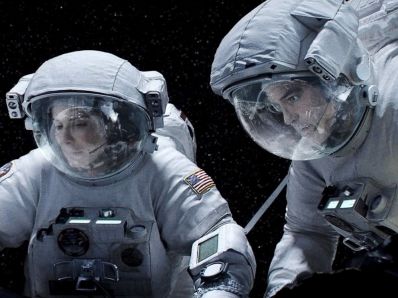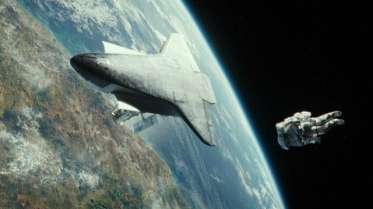 |
| Peace at last. |
Have you ever been curious what spinning weightless would feel like? Gravity is a film that explores momentum and distance with unusual veracity, brought to life by the same technical wizardry that made Alfonso Cuaron’s Children of Men stand out. You will spin, collide, and soundlessly eclipse your way through a screenplay tailored to showcase the problems and inefficiencies of being an oxygen gulping thermophile in a freezing vacuum. The technology on display will make you forget this is an attraction, at least until one of your tour guides opens their mouths. Gravity is foremost a geeky movie, engineered from a love of space.
 |
| But is that spacesuit impervious to Clooney’s charm? |
The film wastes little time, establishing the dimensions and the rules at play with a cleverly edited long shot of a small crew repairing a satellite. This is the calm before the storm, the storm in this case being Kessler Syndrome. Unlike in the moody and character driven PLANETES, which dealt with similar issues, Gravity immediately slams into high alert following an accident that sends the crew into survival mode. Our characters are: a bodiless Houston ground control, the inexperienced astronaut played by Sandra Bullock, and the old hand stranded with her played by George Clooney. Both Bullock and Clooney are able to convey a surprising amount of character shading given the constraints.
Constraints are what this film is all about. Fuel, oxygen, momentum, and orbit are all hastily decaying. Space is unforgiving, vast, and unmalleable. In one scene Bullock survives a harrowing crash but is sent spinning out into blackness. We watched from a fix point as her tiny white bubble of existence drifts away from us and away from Earth, into onyx eternity. Other scenes respect the exaggeration of inertia and momentum in space. Down here in oxygen-ville, gravity and friction tend to bring everything to a halt. In space, there is no common dampening force, so when you push on something it pushes back equally. Gravity captures the difficulty of several death defying leaps, often resulting in careening into orbiting satellites desperately searching for a handhold less you bounce off into emptiness. Gravity even explores space-unique ideas of timing and location. Did something orbit past you? Wait around long enough and you’ll see it again. Now, it’s certainly true that what happens in Gravity is probably unrealistic in an absolute physics sense, but it doesn’t hurt immersion any more than disbelief that McClane could tape a gun to his sweaty back in Die Hard. Space and sci-fi do come under more intense skepticism than most genres, but after years of space explosions and computer lasers (and laser computers), Gravity stands out as a thoughtful exploration of physical realities in space.
 |
| Pictured: Sandra Bullock operates a Russian calculator |
Watching Gravity, you will be compelled into comparison to that other thoughtful high water mark of the genre, 2001. Especially during a particular fetal positioned breather. Unlike most sci-fi, Cuaron’s guidance has resulted in a movie that is slightly metaphysical. However, unlike 2001, the story is less important and more dramatic. While Bullock and Clooney are fine for their roles, the pathos they generate remains unconvincing. Clooney stays Western Saloon calm, and Bullock is all nervous breakdown from the word go. Additionally Cuaron wrote in Bullock’s backstory in an attempt to make her struggle more personal, but the effect is instead off-putting. It’s on-the-nose sentimental, making Bullock into a cypher of grief. That’s not to say these scenes are inappropriate. The maudlin sentiments could have crippled the film, especially in the middle, but Cuaron has some clever tricks to keep things moving and the dialogue is very economical. It’s just that Bullock’s pathos feels perfunctory to the whole ordeal, a red blinking sign in an otherwise subtle and quiet movie. It also forces a type of conclusion that, while apt to the proceedings, is exceedingly difficult to make satisfying. It feels as though the geek space movie was conceived and then received a Cuaron Philosophy graft.
 |
| The movie is primarily set in Tennessee. |
That’s not to say that Cuaron should have left Socrates on the cutting room floor. I admire that Cuaron attempts to tackle a very large theme. It’s just that most of the events in Gravity are paced like a sleek thriller, down to its cold open DNA, and is not quite able to support the grandeur. Space certainly is fascinating, and just looking at our long history and struggle to even be there naturally brings up Cuaron’s questions about whether we even should be colonizing this violent and hostile nothingness, and what drives the people who do it. To the film’s credit, Cuaron states these questions very clearly and also communicates his ideas about them in a visually interesting way, using his skill as a filmmaker to frame shots as claustrophobic, hazy, or as open as the situation requires. Mostly though, Gravity is a fun story through space that seems to actually follow the rules that sci-fi loves to ignore. It’s a technical you-are-there feat that will have you flailing in your seat and planning the next jump for mankind.
3/4
**Originally Published on Synthetic Error December 10, 2013
Comments
Post a Comment